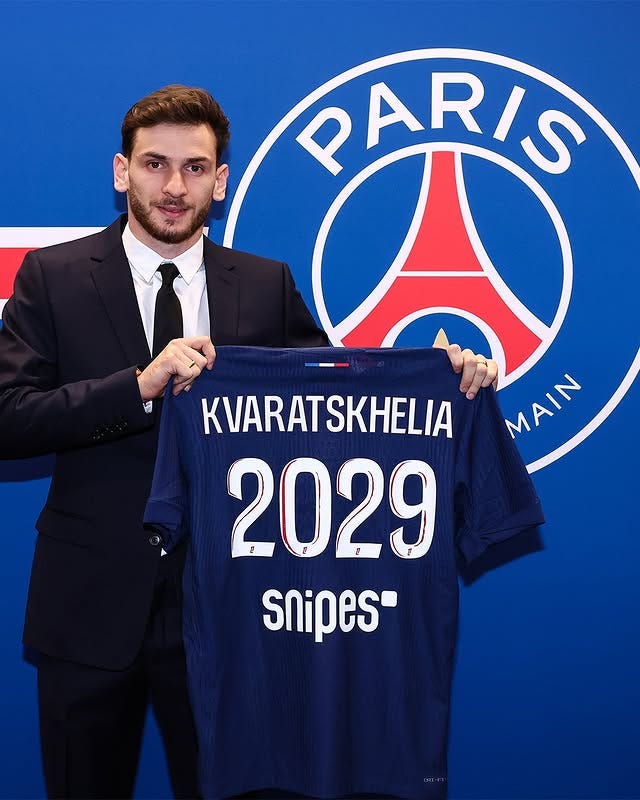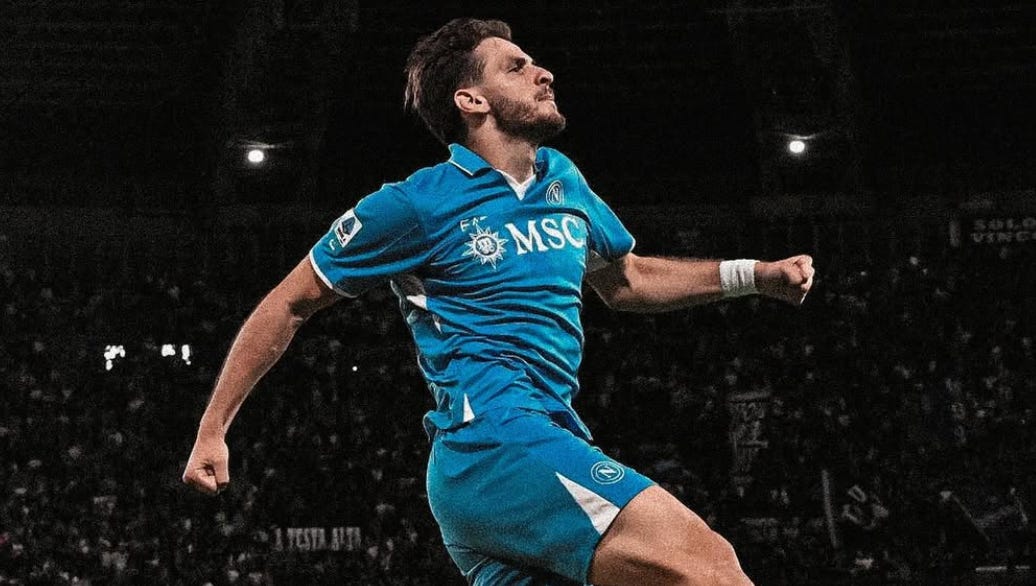Kvaratskhelia Is Just What PSG Needed
In the post-Kylian Mbappe, Neymar and Lionel Messi era, Khvicha Kvaratskhelia is just the type of player PSG needed to invest in.
This is a guest article by Chirag Sharatkumar. Subscribe to Sideline Stories.
On Wednesday evening, Khvicha Kvaratskhelia sat in one of the many polished VIP stands of the Parc des Princes and watched as an impressive Paris Saint-Germain — now and as of a few days ago, his Paris Saint-Germain — overcame a two-goal deficit inside seven minutes to defeat Manchester City 4-2 in the Champions League.
It was comfortable in the end for PSG. Two goals in four minutes midway through the second half and another two before full-time. The only problem for Luis Enrique, perhaps, was that his new Georgian star couldn’t join them. But that didn’t matter. He was in the stands, watching, smiling, nervously at first every time the cameras panned to him, and then excitedly every time PSG burst forward in attack. You can imagine he would’ve been just as eager to join the festivities.
But he will have to wait. Rules are rules, and UEFA’s transfer regulations for the new Champions League format mean Kvaratskhelia will remain a spectator until the knockout stages begin. For PSG, patience has already proven a virtue. They had inquired about the 23-year-old a few windows ago, tried hard to recruit him last summer, failed, come again now in the winter, and finally succeeded. After all that, what’s a few more days?
Last Thursday, after an intense week of rumours, reporting and negotiations, Kvaratskhelia himself posted a video to his social media channels, tearfully announcing his departure from Napoli. The club confirmed it shortly after and moments later, PSG announced his arrival on a four-and-a-half-year deal. A fee in the region of €70 million was agreed with Napoli, who didn’t really want to sell. In the end, they did — because Kvaratskhelia asked them to.
And then it was done. Six months after it had started and six months after Antonio Conte decided to try and convince Kvaratskhelia that his future is indeed in Naples, the player had said his arrivedercis to the Stadio Diego Armando Maradona and bonjours to the Parc des Princes.
PSG’s president, Parisian football’s perennial overlord, Nasser Al-Khelaifi beamed brighter than anyone else. “Khvicha is one of the most exciting players in world football — a fantastic talent, but also a player who has courage and fights for the team above all else,” Al-Khelaifi said upon confirming the signing.
For PSG’s Luises — Luis Enrique, the manager, and Luis Campos, the sporting director — this might just be their most important signing yet. Kylian Mbappe is gone, off to Real Madrid at last. The post-Mbappe era has begun but it hasn’t really. What Mbappe has left behind is more than a gap on the left wing or the small matter of some 40-odd goals a season that need replacing. It feels bigger than that, heavier somehow; a longing sense of having lost something more than just a forward.
PSG remains what it has long been: a collection of supremely talented footballers, by every measure the best team in France, but with something missing. If that something is distilled into star power, the face-of-the-team player, then Kvaratskhelia would never have been the answer.
He is not Mbappe, nor does he try to be. He’s quieter, more self-effacing, less given to grand gestures. At Napoli, he became a cult hero, adored completely, but still unassuming, nothing close to the presence Mbappe carried. No, what’s missing for PSG isn’t just a face, it’s a heart.
Kvaratskhelia could easily be both, though he’d rather not be the face of anything. Timid, sincere, earnest, he is exactly the kind of player who thrives in the affirmation-centric world of a Luis Enrique team. For too long, PSG has been a team of individuals; extraordinary talents surrounded by warm bodies merely there to occupy space.
Luis Enrique has changed that. Mbappe’s departure has left a void, but it has also leveled the dressing room. There are still top players — Ousmane Dembele, Achraf Hakimi, Vitinha and the like — but there’s also a sense of equality now. Luis Enrique’s vision of balance, of parity, is taking shape slowly and Kvaratskhelia feels like a step in the right direction.
Yet, for all this newfound equality, PSG have often been dull on the pitch. Under Luis Enrique, they have been as expected: precise, controlled, sterile even, passing the opposition into submission. There is a sense that the team lacks a cutting edge, a quality of daring and unpredictability that passing patterns and possession sequences cannot provide. In Europe, especially, it has been evident that they lack that flash of audacious improvisation.
Enter Kvaratskhelia. He is not a cog in a machine; he’s the player who breaks the script. His dribbling is instinctive and fearless, his close control mesmerising, his decision-making sharp. But perhaps his greatest asset — what will make him a success at PSG, both on the field and in the dressing room — is his humility. The way he always sees himself as just one of the eleven, working not just with his teammates, but for them, too.
Of course, he will need time to adjust, adapt, to find his rhythm. But there’s no doubting his quality. In his first season in Naples, he scored 14 goals and provided 17 assists to bring Napoli their first Serie A title in 33 years. In his second, despite Napoli’s poor table finish, he was strong, netting 11 goals and picking up nine assists. And this season, his least effective across his time in Italy, he has picked up five goals and three assists.
But he has also left now. The truth is that Naples loves like few cities do and arguably no Napoli player in recent times has felt the extent of that love as much as Kvaratskhelia. He endeared himself to some of football’s toughest fans and even earned himself the nickname “Kvaradona” — an homage to the People’s Saint of Naples, their favourite footballing hero, and one of few men who knows what true Neapolitan love feels like, Diego Maradona.
“Kvaradona” was not just a sign of Naples’ love but of its belief too. With a little more time and a little more success, like the title race that Napoli are in now, it’s not hard to imagine that Kvaratskhelia could have become a legend, immortalised alongside Maradona and Dries Mertens, an adopted Neapolitan forever.
But like many things in football, it is not to be. What comes next is uncertain. PSG have gambled before, usually unsuccessfully, but there’s something a bit different about this move. Kvaratskhelia isn’t a celebrity footballer, or a brand-in-waiting. He’s shy, almost awkward off the pitch, but audacious and clever on it.
As PSG embark on their post-Mbappe era, there’s few players that fit the bill better than Kvaratskhelia to carry them forward. The stage is set in Paris. All that’s left is for him to take it and make it his own, just as he did in Naples.







